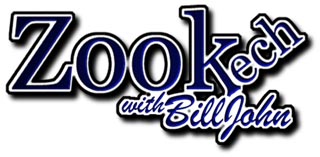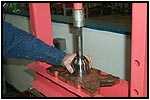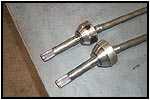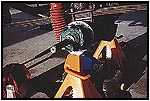

 with Bill Johnston …coming up that gnarly ravine, you turn the wheel just enough to clear that deep void that formed between the rocks. You give it a little gas to get over the last ledge and BAM! One of the front wheels goes powerless and you slide into the hole. When we take our rigs out to play, things tend to break, especially after adding aggressive tires and flexy suspensions. One of the most common breaking points in the drivetrain (besides universal joints) are the birfield joints that allow us to turn the front wheels while under power. Many zook pilots have swapped running gear to beefier stock, and that works. But why not provide a way to increase the strength of what is already there? CALMINI Products Manufacturing did.
We start by placing the front axle on a pair of sturdy jack stands, and then remove the wheels and brakes. You can 'bungee' the brake calipers up and out of the way without loosening any brake lines, it's quick and clean. Drain the oil from the differential and dispose of it. Next come the hubs and the 'C' clip that holds the axles in place. Don't loose anything. I use a butter dish to hold all of the smaller hardware. It saves you major headaches during the reassembly. Next remove the retainer (half) rings from the back of the knuckles. Be careful not to damage the felts under the rings, they are what keep the grime and gunk out of the knuckle.
|
||
|
|
||
  Once
the machining is completed, the cup is pressed on with significant force.
We used a 20 ton press, but I think it was overkill. It could have been
done with a 5 ton with no problem. Don't try it with just a hammer and a
block of wood, it may work with some seals, but don't take a chance with
your birfields. Once
the machining is completed, the cup is pressed on with significant force.
We used a 20 ton press, but I think it was overkill. It could have been
done with a 5 ton with no problem. Don't try it with just a hammer and a
block of wood, it may work with some seals, but don't take a chance with
your birfields. |
||
|
|
||
  Once
enough material is removed to allow full range of motion, all of the
grinding residue must be cleaned up . Next, all of the components must be
repacked with fresh grease and reassembled. Don't forget the 'C' clip on
the outer axle stub when replacing the hub. Fill the differential to the
proper level with gear oil. Once
enough material is removed to allow full range of motion, all of the
grinding residue must be cleaned up . Next, all of the components must be
repacked with fresh grease and reassembled. Don't forget the 'C' clip on
the outer axle stub when replacing the hub. Fill the differential to the
proper level with gear oil. |
||
|
||
|
Source: CALMINI Products, Inc
|
03/14/17 19:17